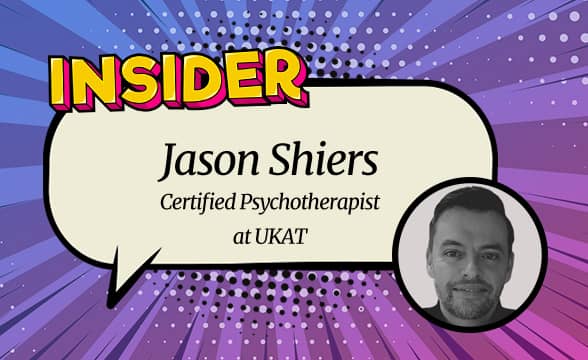- Casino
- By State
- Alabama
- Alaska
- Arizona
- Arkansas
- California
- Colorado
- Connecticut
- Delaware
- Georgia
- Florida
- Hawaii
- Idaho
- Illinois
- Indiana
- Iowa
- Kansas
- Kentucky
- Louisiana
- Maine
- Massachusetts
- Maryland
- Michigan
- Minnesota
- Mississippi
- Missouri
- Montana
- Nebraska
- Nevada
- New Hampshire
- New Jersey
- New Mexico
- New York
- North Carolina
- North Dakota
- Ohio
- Oklahoma
- Oregon
- Pennsylvania
- Rhode Island
- South Carolina
- South Dakota
- Tennessee
- Texas
- Utah
- Vermont
- Virginia
- Washington
- West Virginia
- Wisconsin
- Wyoming
- By State
- Slots
- Poker
- Sports
- Esports
A Look into Why Gambling Becomes Problematic and Addictive for Young People – And a Solution

[1] According to the NHS, the number of gambling related hospital admissions has doubled in the last 6 years. What happens within the minds of young people when they are faced with gambling, how does it become problematic and, how do they become addicted?
From a treatment point of view, there is a lot of focus on the symptoms, and a great effort from the industry on how to control them. We have become so fixated on looking in that direction for our understanding, we look only for the solution from that perspective. This makes sense, but we have stopped using our ingenuity and infinitely creative potential to learn what is really going on, despite the current paradigm of understanding failing.
Q: Why is gambling appealing to young people?
The euphoria of winning is such a high that it gives a large dopamine release and there are also studies that show the attractiveness of ‘reward uncertainty’ [2], for example not knowing when the next win is going to be, gives us a bigger release of dopamine. This is traditionally where people look to understand why, but if someone is happy, secure and content, do they search out external highs?
What I am really asking is this; “does looking into brain mechanisms, neurotransmitters and hormones give us any real help or understanding to why people do it?” It hasn’t worked so far!
Gambling becomes appealing because it’s an escape from our present day created realities, the ones that people live in. All problem gambling and addictions are a conflict, and an escape from life.
The issue is that there is a fundamental misunderstanding at play – “life is created by external circumstances”, and we are the victims of that, when in reality, it doesn’t work that way. 100% of our experience is created within.
Young people are susceptible to chasing the veneer of a polished life, that is advertised all over our social media feeds daily. It perpetuates the idea that, “if only I could get that laptop lifestyle, or that Lamborghini, ‘then’ I will be ok”. From day 1, they are already caught up chasing an illusion of what they think will make them feel ‘better’.
Q: What are they escaping from?
To many people, they believe they are faced with the choice of either working hard, trying to create a life that’s ‘better’ for themselves, with more wealth, education and status; or accept life for what it is, an experience that is mediocre for them that will also inevitably have conflict and suffering, something far from polished.
It looks like the external world is factual/concrete. Things like the pandemic, difficult circumstances, boredom, isolation, relationship breakdowns all look like potential problems to find a solution to.
But life by nature brings conflict, be it between families, relationships, friends/peer pressure, health, or struggles with education. With our current understanding, we make up strategies and techniques to cope with people or change places or things in order to make us feel better.
If we truly believe the cause of conflict and unhappiness that we experience in our lives is the direct result of people or circumstance from our external environments, then I ask you this:
“How is it possible that people without opportunities can also thrive and have a happy life? When there is no opportunity for education, and they are not born into wealth, or they are born with disabilities, they can still live a life of security and contentment?”
Let’s try to remind ourselves; there are stories out there where someone came from nothing, or experienced a life changing tragedy or was born with disabilities and then went on to achieve remarkable things regardless.
So, can it really be true our external world controls our happiness? Controls our security and contentment? Are we stuck in our own suffering without the ability for change? Beyond that of having to turn to gambling or addiction as a solution?
The world is obsessed with “why gambling”, it’s completely overlooking the “why suffering” aspect that precedes all of it.
Q: What’s the source of the struggle?
The source of all suffering is not the life we lead, but our thinking about the life we lead.
Dr Bill Pettit, Thomas Kelley PhD and Dr Jack Pransky said in their research paper about an inside-out perspective of experience [3]:
“We posit that people can use their ability to think in a manner that either produces distressing symptoms or in a way that produces mental well-being and common sense.”
This quote points out that people have the means to use the power of thought, to create their own happiness or their own suffering. They make it clear that life is an “inside out experience”, it doesn’t have to be what most people think it is, “an outside in experience”. People have both the ability to think their life is successful or a failure based on how they assess how far they think they have got.
The research paper went on to say:
“Just as there is an innate health-producing design behind every human system (i.e., gastro-intestinal, cardio-vascular, excretory) we posit there is also an innate health-generating design behind the agency of thought; that virtually everyone is born thinking in an effortless, free-flowing way and experiencing mental health.”
Effectively, the mind is a self-correcting system. We are all born with innate mental health. Suffering is something learnt within our human experience. It is for this reason, therefore, it can be undone and corrected by simply realising of how it works, an insight.
What’s important to note here is, no-one chooses to suffer. The simple intellectual understanding of the way it works is not sufficient enough to change everything being experienced, but it’s the definitely the start to looking in the right direction.
Q: Is there further evidence to suggest current findings are not working?
Dr Thomas Insel – Psychiatrist and Neuroscientist – Head of the National Institute for Mental Health for 13 years said recently:
“I spent 13 years at NIMH really pushing on the neuroscience and genetics of mental disorders, and when I look back on that I realize that while I think I succeeded at getting lots of really cool papers published by cool scientists at fairly large costs—I think $20 billion—I don’t think we moved the needle in reducing suicide, reducing hospitalizations, improving recovery for the tens of millions of people who have mental illness.” [4]
If the people at the top of psychiatry and psychology are already stating that their respective field of expertise couldn’t find a solution, or a simple explanation, and the problem is getting worse, we have to look in a new direction, to a different paradigm of understanding mental illness.
Q: What would a new direction to look in for a solution be?
If gambling is just the steam valve that lets off some steam before a young person’s mind gets overloaded, it’s not the problem. It’s just a symptom. And that value system is working exactly as it should be. They are saving themselves from further mental illness, psychosis or suicide.
What we need is a new level of consciousness, to be able to see beyond what we already know. We need to help young people to see the actual source of their experience, how the system really works, and take their focus away from the symptom being paraded around as the problem. We need to help them see clearly that they can be happy, content and secure regardless of their external circumstances. This is the missing link in resolving problem gambling.
Jason Shiers is a Certified Transformative Coach & Certified Psychotherapist @ UK Addiction Treatment (UKAT). Jason has been working with addictions and mental health for over 25 years in evolving ways.
References:
- [1] https://www.england.nhs.uk/2019/12/nhs-fighting-back-against-gambling/
- [2] https://www.ncbi.nlm.nih.gov/pmc/articles/PMC3845016/
- [3] https://www.researchgate.net/publication/335534096_A_new_inside-out_perspective_on_general_factor_p
- [4] https://www.psychologytoday.com/gb/blog/theory-knowledge/201705/twenty-billion-fails-move-the-needle-mental-illness
Mike made his mark on the industry at a young age, consulting for companies that would later become regulators. As one of the lead editor of Gambling News, he dedicates his weekdays to this project, aiming to educate the masses on the latest developments in the gambling circuit. His expertise and passion for the industry make him an invaluable asset to our team.
Must Read
Insider
May 15, 2025
Joshua Gamble: “Cross-sell is dead. What next?”
More Articles





Sports
July 15, 2025
Undercover Spotters Catch Wimbledon Betting Spies

Industry
July 15, 2025
UK Considers Gambling Tax Hike to Fill Budget Gap

Poker
July 15, 2025
Leo Margets, Ready for Historic WSOP Final Table

Casino
July 15, 2025
Uno Is Coming for Casinos in the United States











